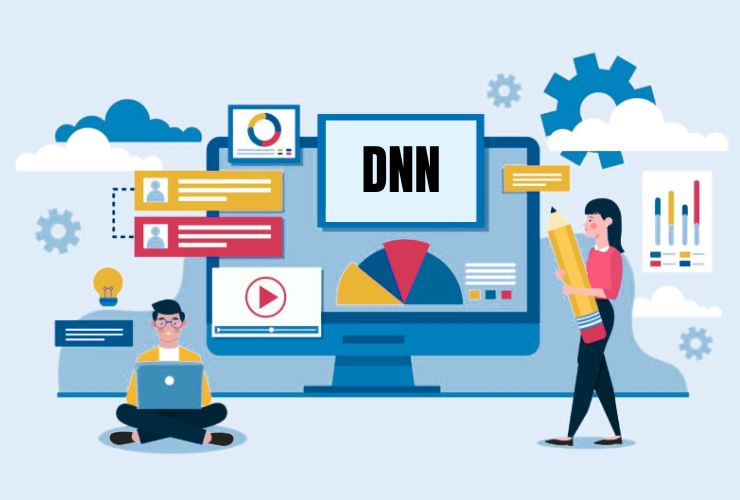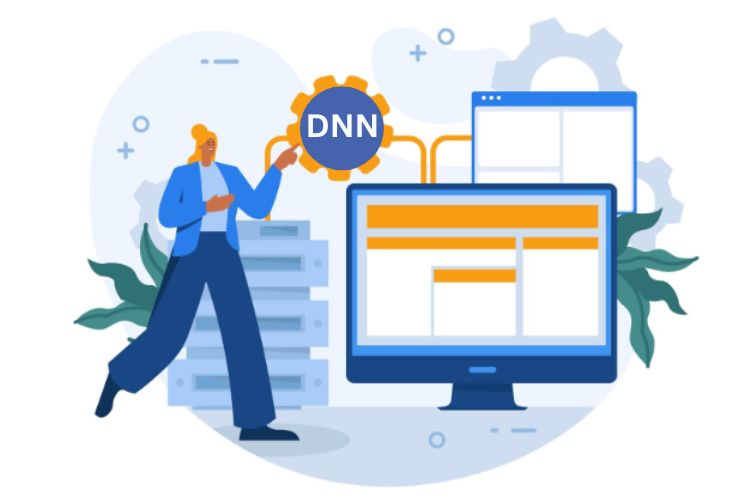Is DNN the Right CMS for Your Business Website?
When building a business website, choosing the right Content Management System (CMS) can either make or break your online destiny. Your CMS must not only be effective in handling your content but also scale with your business, offer decent security, and integrate well with your systems.
DNN (DotNetNuke) is a tested,.NET-based content management system that underlies thousands of business sites and web applications. With its impressive heritage and endorsement from the community of Microsoft developers, DNN has emerged as a solution du jour for business organizations demanding outstanding performance, ease of use, and security. But is that necessarily the way to go with your business?
Let us go on a tour of DNN’s features, benefits, and potential drawbacks and help you make an informed decision.
What is DNN?
DNN, or formerly DotNetNuke, is an open-source content management system based on the Microsoft.NET framework. It enables organizations to create rich, interactive web pages and sites without having to start from scratch.
DNN’s most attractive aspect is that it is strongly modular in design, which facilitates the addition of custom functionality as modules and extensions by developers. It offers multi-site administration, strong control over user roles, and enterprise-grade tool integration, making it a good fit for large-scale, intricate web solutions.
In its business variant—DNN Evoq—it offers additional features like advanced analytics, personalization functionality, cloud-ready hosting, and support, which are suited for more complex business requirements.
Who is DNN Best For?
DNN is ideal for organizations and businesses that:
- Are in a Microsoft-centric IT environment
- Require scalable solutions that scale with them
- Require high-level security and role-based access control
- Are planning to host multiple websites on a single CMS
- Have .NET developers or a dev team that is experienced with Microsoft technologies
- Require extensive customization and integration with internal systems
Whether you’re a mid-sized company, a government agency, or a large enterprise, DNN can be a strategic choice if your priorities align with what the platform offers.
Key Features of DNN CMS
1. Modular Structure
DNN uses a plug-and-play module-based structure, and you can therefore add features to your site without disrupting core activities. Common modules are forums, blogs, e-commerce functions, analytics, and so on.
2. Strong Security Framework
Security is paramount in DNN. It contains built-in role-based access control, authentication functionality, and fine-grained permissions management. This makes it extremely appealing to industries demanding regulatory compliance.
3. Multi-Site Management
DNN enables you to host and manage several sites over a single install. It is best for companies with regional sites, brand portal sites, or microsites.
4. Theming and Customization
Programming custom skins, design, and theme deployment is done by programmers using HTML and CSS so that businesses have total control over branding and site styling.
5. Integration Capabilities
Since it is based on the.NET platform, DNN naturally integrates with Microsoft products such as SharePoint, Azure, Office 365, and Active Directory, among third-party APIs.
6. Scalability and Performance
It’s high-performance designed. It supports caching, CDN integration, load balancing, and more, out of the box, that enables it to scale effortlessly with your traffic and content demands.
Benefits of Using DNN for Your Business Website
Enterprise-Level Reliability
DNN is trusted by many top businesses and government organizations. Its stability, decade-plus heritage of development, and active community make it a go-to platform for mission-critical web sites.
Ease of Use by Non-Technical Staff
While DNN is a developers’ system, it is also available through an easy-to-use admin interface. Marketing and content teams can work with pages, media, and changes to content without ever having to write code.
Custom Development Opportunities
The open-source nature of the platform allows companies to develop custom modules that meet their unique business needs. This flexibility gives you a competitive edge in developing custom digital experiences.
Cost-Effective in the Long Term
While additional technical expertise is required for initial development, modularity and scalability of DNN reduce long-term maintenance and expansion costs.
Rich Ecosystem and Community Support
DNN has an active community of developers and an enormous library of pre-existing modules and extensions that can be used to save development time and dollars.
Possible Disadvantages of DNN
No CMS is ideal. Below are some areas where DNN will not be the ideal option:
Increased Learning Curve: For small businesses or non-technical users, DNN may be too complex to begin with.
Needs.NET Hosting: Since DNN is a .NET framework based application, it has less hosting options compared to other CMS platforms based on PHP.
Development Cost: Module development for bespoke solutions could be costlier than using plug-ins already installed elsewhere.
If your organization needs a very secure, highly scalable, and highly customizable CMS and is already using Microsoft technology, DNN could be an excellent fit. It excels in scenarios with multi-site support, complex user roles, and custom integrations.
However, if you are a small organization needing a straightforward and speedy deployment with minimal development resources, a less feature-heavy CMS like WordPress may be the better option.
Lastly, the right CMS is founded on your company needs, technical environment, and desired future. Taking guidance from a CMS development expert can help decide which platform best aligns with your vision.
Conclusion
DNN is a robust CMS built with enterprise-class functionality in mind. Its rock-solid.NET platform, extensible architecture, and advanced security features render DNN an attractive option for organizations seeking long-term digital expansion. Whether you’re building a large business site, government portal, or scalable intranet, DNN offers the essential features to support your goals. Its flexibility and robust toolset ensure long-term success across various use cases.
Before making a final decision, take time to assess your company’s specific requirements. Consider the total cost of ownership, including implementation and maintenance. Evaluate how well DNN integrates with your existing infrastructure. When chosen thoughtfully, DNN can become the cornerstone of your digital strategy for years to come.
While DNN offers a solid foundation for enterprise-grade content management, unlocking its full potential requires strategic planning, technical proficiency, and a deep understanding of Microsoft-based ecosystems. That’s where implementation expertise becomes crucial.
At Empirical Edge, we bring years of experience in architecting and deploying DNN-based web solutions tailored to business-critical needs. From complex multi-site configurations and custom module development to seamless integration with Microsoft services and third-party systems, we ensure DNN works exactly the way your business demands.
If you’re considering DNN for your organization, connect with our experts to explore how we can turn your CMS vision into a scalable, secure, and high-performing digital platform.











